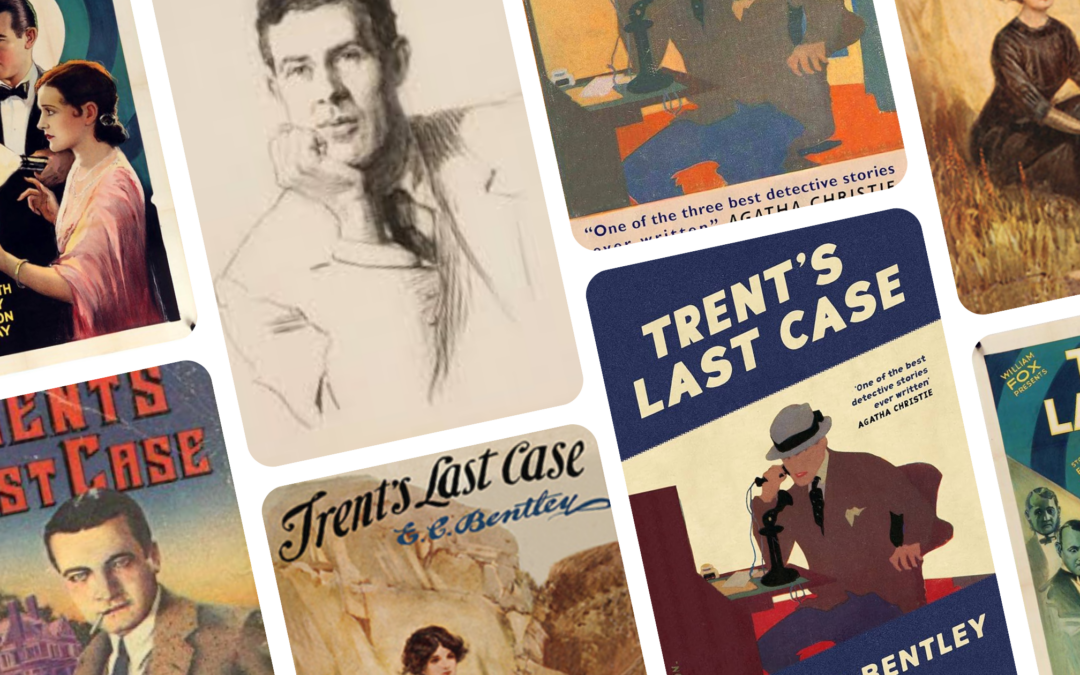Introducing Your Young Detective to E.C. Bentley’s Philip Trent Mysteries
Meet E.C. Bentley. The Forgotten Friend of Chesterton Who Revolutionized Detective Fiction.
If your children enjoy detective stories and have already gone through G.K. Chesterton’s beloved Father Brown books, I’d like to recommend another English writer of the early 20th century, Edmund Clerihew Bentley (sometimes known as E.C. Bentley). Edmund Clerihew Bentley (1875-1956) was a schoolyard companion of G.K. Chesterton who remained friends with GKC throughout his life. Chesterton even dedicated his landmark 1908 novel, The Man Who Was Thursday, to Bentley in memory of their childhood escapades. Like Chesterton, Bentley also worked as a journalist, became an author of fiction and non-fiction, and dabbled in poetry.
The Philip Trent Stories
Bentley’s best-known literary works are his series of mysteries centered on the fictional detective Philip Trent. Clerihew’s Trent stories debuted with the 1913 novel Trent’s Last Case, which, despite the name, was the first appearance of detective Trent. The story is set in the English countryside, where Detective Trent is investigating the shooting death of a wealthy American businessman.
Besides being one of the first “whodunits” in modern mystery literature, Trent’s Last Case is unique because of how it handles the murder investigation by the titular character, Philip Trent. Unlike Arthur Conan Doyle’s Sherlock Holmes, whose deductive faculties enable him to make breathtaking insights from details overlooked by others, Trent’s painstaking analysis of evidence often leads him to make the wrong conclusions. The revelation is not about how the evidence indubitably leads to a logically certain outcome, but rather on the limits of what empirical evidence can tell us. In other words, while Doyle’s Holmes takes what we might call a materialist approach to crime-solving, Bentley’s Trent demonstrates the importance of immaterial elements, such as intention, which cannot always be deduced from empirical evidence alone.
When I first read Trent’s Last Case, I immediately thought it was one of the best detective stories I’d ever read, if not the best. In this, I share assessments from many of the greats. G.K. Chesterton himself wrote that Trent’s Last Case was “the finest detective story of modern times.” Dorothy Sayers similarly said that it “shook the little world of the mystery novel like a revolution.” Even Agatha Christie, arguably one of the greatest mystery novelists of all time, called it “one of the best detective stories ever written.” The novel earned Bentley a place among the great mystery novelists. In fact, from 1936 until 1949, Bentley would serve as president of the Detection Club, a British society of mystery writers founded by G.K. Chesterton and boasting such illustrious members as Agatha Christie, Dorothy Sayers, Ronald Knox, and Hugh Walpole.
The success of Trent’s Last Case prompted two more installments in the Trent series, Trent’s Own Case (1936) and a book of Trent short stories called Trent Intervenes (1938). While Bentley’s corpus is not large, it is nevertheless a very valuable part of 20th-century detective fiction. Therefore, it deserves study by anyone who loves mystery. Based on my own reading, I would say that the Trent stories are accessible to high schoolers with average reading aptitude.
The Clerihew
Bentley is also known for inventing and popularizing the clerihew, a type of poem. Bentley invented the clerihew in high school at 16. It is a whimsical, four-line, irregular poem about a biographical subject. The lines vary in length for comedic effect. The rhymes are often forced and somewhat absurd. The first line always consists of the subject’s name, and the poem follows an AABB rhyme pattern.
Here is an example of a clerihew. In fact, it is the first clerihew, penned in 1891 when Bentley was 16 years old, about Sir Humphrey Davy (d. 1829), the British chemist who discovered sodium and potassium:
Sir Humprey Davy
Abominated gravy.
He lived in the odium
Of having discovered sodium.
Here is another one of Bentley’s more popular clerihews, which was about the Restoration-era architect, Sir Christopher Wren, who redesigned London’s St. Paul’s Cathedral after the Great Fire of 1666:
Sir Christopher Wren
Said, “I am going to dine with some men.
If anyone calls
Say I am designing St Paul’s.
Clerihews are a wonderful little type of poem that children can easily understand and master. A fun writing assignment might be to have your child select three historical figures and write clerihews about them. Here’s an example of two clerihews I composed about King Henry VIII of England and Augustus Caesar:
Henry the Eighth
Abandoned the faith
But, growing weary of his wives
Took their lives
Augustus Caesar
Lived to be a geezer
Forty years he reigned
The republic, he feigned
Conclusion
E.C. Bentley’s writing, whether in the form of ingenious detective fiction or playful clerihews, offers families a delightful doorway into early 20th-century English literature. His Trent novels provide thoughtful, unconventional mysteries perfect for young detectives, while his lighthearted poetry invites kids to play with language and history. Therefore, introducing Bentley to your homeschool is an enriching way to deepen your children’s love of reading and creativity.
What are your favorite classic novels? Your teen’s favorite mystery author or poet? To continue the discussion, join me and other homeschooling parents in the Homeschool Connections Facebook Group or in the HSC Community.
NOTE: This article contains affiliate links.






